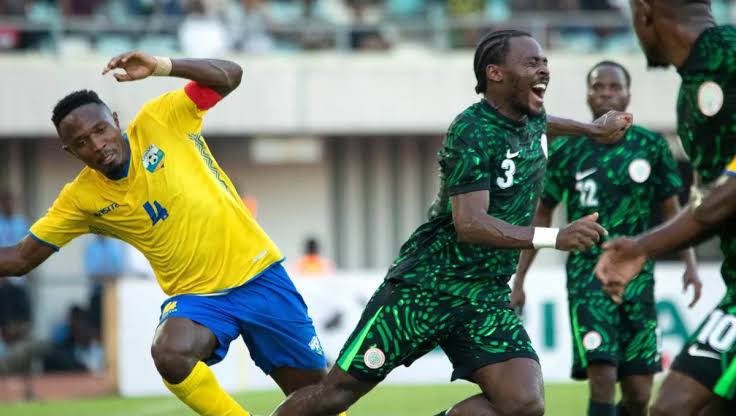Nigeria vs Rwanda: 2026 W/Cup qualifier match review, tactical takeouts, highlights

Nigeria vs Rwanda in matchday 7 of 2026 World Cup qualifiers. Photo Credit- Afrik foot
On September 6, 2025, the Super Eagles of Nigeria faced Rwanda’s Amavubi at the Godswill Akpabio International Stadium in Uyo for a pivotal Matchday 7 clash in the 2026 FIFA World Cup qualifiers. With both teams vying for crucial points in a tightly contested Group C, where South Africa led the pack, the encounter promised intensity and drama. Nigeria, under coach Eric Chelle, aimed to leverage their attacking firepower and home advantage, while Rwanda, led by Adel Amrouche, sought to frustrate their hosts with disciplined defending. The match delivered a tactical battle, with Nigeria securing a narrow 1-0 victory through a second-half goal from substitute Tolu Arokodare. Below is a comprehensive review of the match, analyzing the tactics employed, refereeing decisions, key highlights, lessons learned, and a summary of the outcome.
Nigeria vs Rwanda match summary
Nigeria’s 1-0 victory over Rwanda was a hard-fought result that kept their 2026 World Cup qualification hopes alive in Group C. Tolu Arokodare’s 51st-minute goal, following a scrappy sequence, proved the difference after Nigeria struggled to break down Rwanda’s compact defense in the first half. The Super Eagles were dealt a blow with Victor Osimhen’s 34th-minute injury, but their second-half adjustments, including Arokodare’s introduction, showcased their resilience. Rwanda’s disciplined defending frustrated Nigeria, but their lack of attacking threat limited their chances, with a late header cleared off the line marking their closest effort. Referee Allaou Mahamat managed the game well, though the absence of VAR sparked debate over the goal. Nigeria’s win moved them above Rwanda in the standings, but with South Africa leading, both teams face critical challenges ahead. The match underscored Nigeria’s need for clinical finishing and Rwanda’s need for offensive improvement in a fiercely competitive group.
Analyzing tactics in Nigeria vs Rwanda
Nigeria deployed a 4-2-3-1 formation, balancing attacking intent with defensive solidity, featuring Stanley Nwabali in goal, a backline of Bright Osayi-Samuel, Calvin Bassey, William Troost-Ekong, and Ola Aina, with Wilfred Ndidi anchoring the midfield. Alex Iwobi, Frank Onyeka, and Ademola Lookman supported forwards Victor Osimhen and Samuel Chukwueze, focusing on quick transitions and exploiting the flanks to deliver crosses for Osimhen. Lookman’s creativity aimed to unlock Rwanda’s defense, while Ndidi’s shielding role and a high defensive line limited counter-attacks. Rwanda’s 4-1-4-1 setup, with Fiacre Ntwari in goal, a back four of Bonheur Mugisha, Ange Mutsinzi, Thierry Manzi, and Claude Niyomugabo, and Innocent Nshuti in midfield, prioritized a low-block strategy to clog central areas. Jojea Kwizera led the line, aiming to spark counters, but Rwanda’s lack of attacking potency was evident. Nigeria’s halftime introduction of Tolu Arokodare shifted the dynamic, with his physicality leading to the decisive goal, while Rwanda’s defensive resolve faltered late as they pushed for an equalizer, exposing gaps.
Analyzing referee officiating
Chadian referee Allaou Mahamat, assisted by Bogollah Issa, Moussa Hafiz, and fourth official Abdelkerim Ousmane, managed the match competently, though not without controversy. In the 8th minute, Victor Osimhen’s goal was correctly disallowed for offside, a clear but frustrating call for Nigeria. Mahamat issued three yellow cards to Rwanda players, including Fiacre Ntwari and Fitina Omborenga, for robust challenges, reflecting their physical approach. The decisive moment came with Tolu Arokodare’s 51st-minute goal, which Rwanda contested as offside, but without VAR, the referee’s decision to allow it stood, appearing legitimate in real-time. Mahamat maintained control, adding three minutes of stoppage time in the first half and five in the second, appropriate for the game’s physicality and stoppages. The absence of VAR underscored challenges in African qualifiers, as close calls sparked debate, but Mahamat’s overall performance was fair and consistent.
Major highlights in Nigeria vs Rwanda
The match was defined by several pivotal moments. In the 8th minute, Victor Osimhen’s tap-in from Ademola Lookman’s cross was ruled offside, setting a frustrating tone for Nigeria. Osimhen’s injury in the 34th minute forced his substitution with Cyriel Dessers, disrupting Nigeria’s attack. Alex Iwobi’s 32nd-minute curling shot, tipped over by Fiacre Ntwari, highlighted Rwanda’s defensive resilience. The breakthrough came in the 51st minute when Tolu Arokodare scored a scrappy volley after his initial shot was blocked and Lookman’s follow-up was half-saved, securing a 1-0 lead. Rwanda’s late chance saw a header cleared off the line by Calvin Bassey, with Stanley Nwabali securing the follow-up to preserve the clean sheet. Ntwari’s double save against Moses Simon and Lookman kept Rwanda in contention, but Nigeria’s second-half intensity proved decisive.
Final take
The 1-0 result offered critical lessons for both teams. Nigeria’s struggle to convert chances, evident in Osimhen’s disallowed goal and missed opportunities, highlighted the need for clinical finishing to secure points in Group C, especially against leaders South Africa. Tolu Arokodare’s impact as a substitute emphasized squad depth and tactical adaptability, vital with Osimhen’s injury raising concerns about Nigeria’s reliance on him. Rwanda’s disciplined low-block nearly earned a draw, but their lack of shots on target until late exposed their attacking deficiencies, a key area for improvement. The absence of VAR, evident in the debate over Arokodare’s goal, underscored the need for technology in African qualifiers to ensure fairness. Nigeria’s win moved them to 10 points, overtaking Rwanda’s 8, but with South Africa at 16, the result highlighted Group C’s competitiveness, where precision and adaptability will be crucial.

